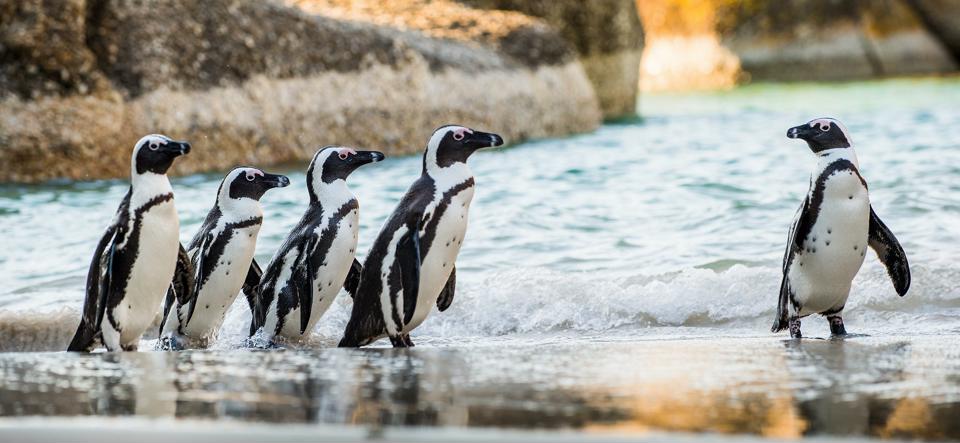27- 28 November 2017 | Building International Partnerships
![]() Download the Agenda_at_a_glance
Download the Agenda_at_a_glance
![]() Download the full working agenda
Download the full working agenda
![]() Download the photobook of the event
Download the photobook of the event
About the Meeting
It covered, in particular, experience sharing examples and best practices of existing collaboration between Large Marine Ecosystem programmes, Regional Seas Conventions and Actions Plans, Regional Fisheries Agreements and Regional Fisheries Management Organisations (RFMOs); exploring how regional institutions and projects are utilising science to support countries in implementing ecosystem approaches as well as how that will support the 2030 Agenda and associated Sustainable Development Goals (targets and indicators); and identifying partnerships at the regional level between all initiatives, including Marine Protected Areas (MPA), Marine Spatial Planning (MSP), Integrated Coastal Management (ICM), fisheries and climate change adaptation initiatives to strengthen regional ocean governance.
The Cape Town meeting will be a direct follow-on and answer to the calls for implementation of commitments, which emanated from the June 2017 Sustainable Development Goals Conference in New York. The Cape Town meeting aims to guide consolidated efforts by countries, with the support of various international organizations, to manage different aspects of shared marine ecosystems.
About 150 participants are expected to attend the conference, including leaders from government ministries, project managers, private sector, civil society, donor agencies and LME: LEARN partner agencies. Please note that, owing to capacity constraints, this Meeting is by invitation only.
Presentations and Meeting Content:
1 - Opening session
Welcome Address - Andrew Hudson, UN Development Programme
Welcome Remarks - Christian Severin, Global Environment Facility
2 – Key institutions responsible for ocean governance
Review of the agenda and objectives of the meeting
Ivica Trumbic, GEF LME: LEARN PCU
Overview of existing instruments and mechanisms for ocean governance and major stakeholders
Gail Lugten, University of Tasmania, Australia
Delivering Adaptive Ocean Management through collaborative Governance
David Vousden, Rhodes University, South Africa
Panel discussion: Opportunities for cooperation between major stakeholders through their institutional perspectives
Panelists
• Vladimir Ryabinin, IOC-UNESCO
• Merete Tandstad, FAO
• Andrew Hudson, UNDP
• Lisa Svensson, UN Environment
• Nick Bax (on behalf of CBD)
3 – Best practices of regionally-based science partnerships supporting ocean and coastal governance
Setting the stage: Regional science partnerships and networks in LMEs, RSs, and RFMOs
Kirsten Isensee, IOC/UNESCO
Panel session: Key aspects and experiences in building effective science cooperation mechanisms (5-6 mins each).
Panelists
1. Regional scientific cooperation on Eastern Boundaries upwelling impacts: Example from the Humboldt and Benguela LME region (Veronique Garçon, CNRS)
2. Science processes within regional fisheries organizations:
Example from the General Fisheries Commission for the Mediterranean – GFCM (Abdellah Srour, GFCM Executive Secretary) - Given by Merete Tandstad, FAO
3. Sustained ocean observation networks and applications to strengthen understanding of ecosystem function and biodiversity changes at regional level (Nick Bax, CSIRO, Australia)
4. Role of regional MPA networks in providing a regional approach for science to support effective MPA management (Lauren Wenzel, NOAA)
5. Setting up collaborative research goals to support EBM implementation: From regional science plan to Action plan - Experience from the Caribbean (Robin Mahon, Centre for Resource Management and Environmental Studies –CERMES, Barbados)
6. Regional Science Networks: Example of the Western Indian Ocean Marine Science Association (Julius Francis, WIOMSA)
4 - Science-policy interface: How science can inform effective regional ecosystem-based ocean governance
Setting the Stage: Bridging the gap between policy and science in assessing marine ecosystems
Robin Brown, PICES
Panel session: Implementing effective science/policy mechanisms (5-6 minutes each).
Panelists
1. Case of LME Benguela Current (Hashali Hamukuaya, Executive Secretary, BCLME Commission)
2. Science -policy issues in tuna bodies (Chris O’Brien, IOTC Executive Secretary) - Given by Jacqueline Alder, FAO
3. Science-policy processes within Mediterranean Action Plan (Gaetano Leone, Coordinator of the Mediterranean Action Plan-Barcelona Convention Secretariat)
4. Building regional knowledge and technical capacity for Ecosystem Approach to Marine Fisheries: Example of the EAF Nansen Programme (Merete Tandstad, FAO)
5. Ecosystem-related monitoring, assessments and management advice for the Norwegian and Barents Seas (Gro van der Meeren, IMR/ICES, Norway)
6. Strengthening Regional Ocean Governance for the High Seas (Hannah Thomas, UN Environment/WCMC)
5 – Regional partnerships to strengthen ocean governance
Breakout Session 5.1 Latin America and the Caribbean
- Introduction to Discussion
Patrick Debels, GEF-UNDP-UNOPS Caribbean Sea LME Plus Project - CLME+ Experience
Patrick Debels, GEF-UNDP-UNOPS Caribbean Sea LME Plus Project - Permanent Commission for the South Pacific
CNRA Julian Reyna M. Permanent Commission for the South Pacific - Building science policy interfaces: some experiences from the Caribbean
Robin Mahon, Centre for Resource Management and Environmental Studies (CERMES), University of the West Indies, Barbados
Breakout Session 5.2 Africa
- How is social science integrated in regional ocean governance and what are the opportunities for partnerships and cooperation among science institutions?
Julius Francis (WIOMSA) - Challenges and opportunities in cooperation between institutional actors at regional ocean level and within LMEs
David Vousden (Rhodes University, South Africa) - Role of partnerships for long-term monitoring and opportunities for collaborative research
Kwame Koranteng - Environment and Fisheries Partnership for the implementation of the CCLME project
Birane Sambe, FAO
Breakout Session 5.3 Asia and Pacific
- Regional cooperation in the governance of tuna fisheries
Hugh Walton, Forum Fisheries Agency (FFA) - The BOB LME partnership
Rudolf Hermes - Integrated management of critical coastal habitat in East Asian Seas
Jerker Tamelander, COBSEA/UN Environment - Climate change impacts in the Pacific, lessons learned from the GEF-OFMP project
Valerie Allain, SPC - Use of science in coastal planning: ICZM Plan of the State of Odisha, India
Anuja Shukla, IPE Global - Bridging the gap in management of fisheries resources and ecosystems in the North Pacific ABNJ: Progress and challenges
Aleksandr Zavolokin, North Pacific Fisheries Commission (NPFC)
6 - Sustaining regional collaboration for ocean governance
7 – Closure of the meeting: The way forward



